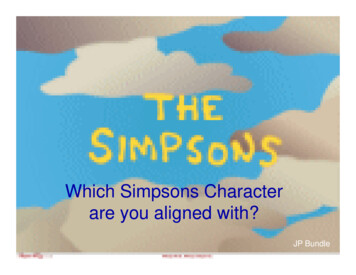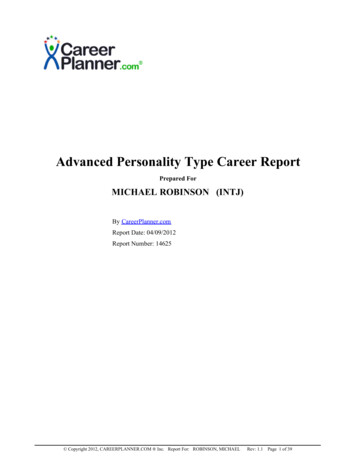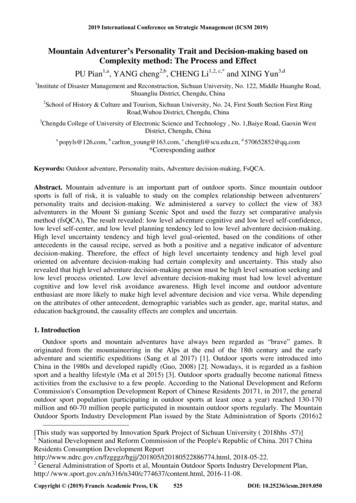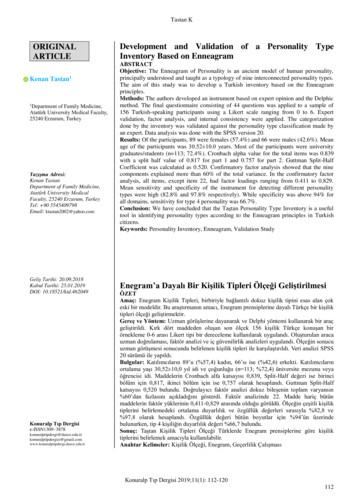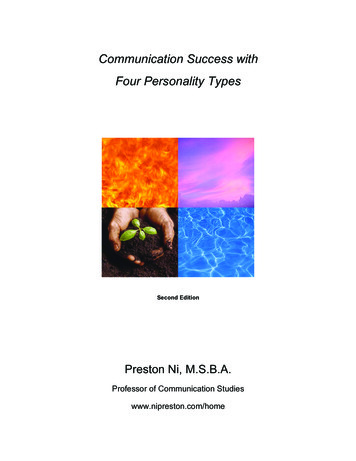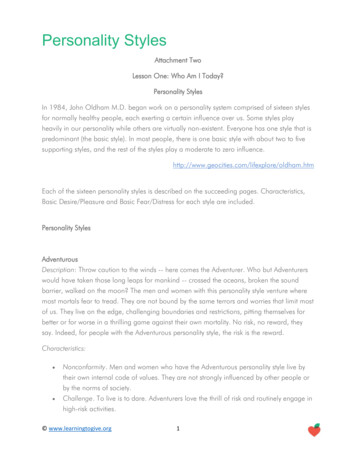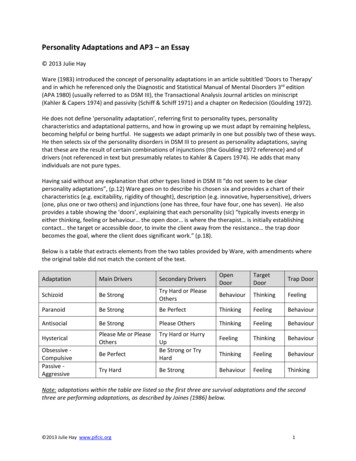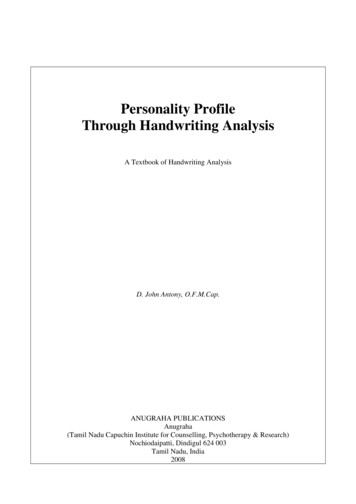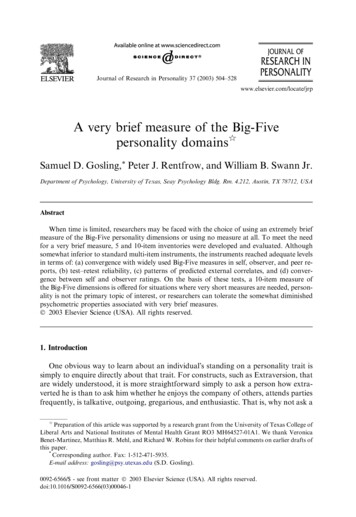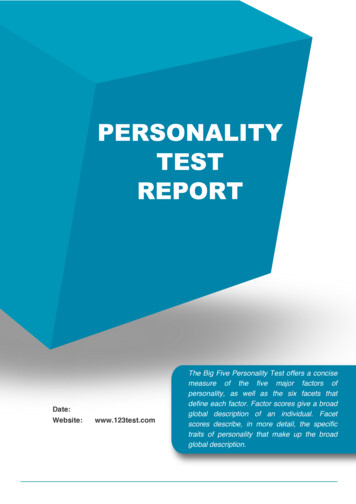
Transcription
PERSONALITYTESTREPORTSAMPLE REPORTDate:18-12-2014Website:www.123test.comThe Big Five Personality Test offers a concisemeasure of the five major factors ofpersonality, as well as the six facets thatdefine each factor. Factor scores give a broadglobal description of an individual. Facetscores describe, in more detail, the specifictraits of personality that make up the broadglobal description.
12Content of the reportThe Big Five Personality Test offers a concise measure of the five major factors ofpersonality, as well as the six facets that define each factor. Factor scores give abroad global description of an individual. Facet scores describe, in more detail, thespecific traits of personality that make up the broad global description.1. Content of the report2. Introduction3. Part One - Overview4. Part Two - A more in-depth look4.1. Area measured: Openness to experience4.2. Area measured: Conscientiousness (Work ethic)4.3. Area measured: Extraversion4.4. Area measured: Agreeableness4.5. Area measured: Natural reactions5. ConclusionEnjoy reading your Personality Test Report!Test taken on 18-12-2014Personality Test ReportPage 23
122. IntroductionAccuracyHigh and low score descriptions are usually accurate. However, scores which fallclose to the low or high boundaries may describe you less accurately.The Big Five Personality Factors and FacetsEach of the five factors has 6 facets. It is quite common for facet scores to be inranges similar to - or close to - the factor score. However, on occasions there can bedifferences. In such cases we recommend that you pay more attention to the facetscores than to the broad factor scores.The Big Five FactorsOpenness toImaginationWillingness to experimentExperienceArtistic interestsIntellectual curiosityDepth of emotionsTolerance for diversitySense of competenceAchievement strivingOrderlinessSelf-disciplineSense of responsibilityDeliberatenessWarmthActivity levelGregariousnessExcitement seekingAssertivenessPositive emotionsTrust in xietySelf-consciousnessAngry tivity to tural reactionsTest taken on 18-12-2014Personality Test ReportPage 33
12Understanding the scoresThis report ranks your scores within a range from 'very low' to 'very high'. To enableyou to make a comparison the percentage of people* who normally fall within eachrange is indicated.*Normal adult working population. Please note that distribution of scores may differ ifcomparisons are being made against other cultural, demographic or specificoccupational groups.You will find that we have described low and high scorers for each of the factors andfacets. This has proven to be an effective method of ensuring that people understandthe personality trait being measured. People who score in the 'middle' range will be adiffering mixture of both the high and low descriptions - but less extreme.7%23%40%23%7%Very lowLowMiddleHighVery highApproximate distribution for normal adult working population:RangesVery lowLowMiddleHighVery highCumulative percentile 7%7%-30%30%-70%70%-93% 93%Range size7%23%40%23%7%Test taken on 18-12-2014Personality Test ReportPage 43
12The Strongest Personality FactorThe Factor test score furthest away from 50 - above or below - indicates the person'sstrongest personality trait.This personality trait is likely to have the greatest influence on your overall behaviour,motivation, values and reactions to life and work situations. The next furthest awayfrom 50 - above or below - is likely to have the next greatest influence and so on.Score range descriptionsScore descriptions are usually accurate. However, if the score falls close to aboundary, the description may be less accurate.Test taken on 18-12-2014Personality Test ReportPage 53
123. Part One - OverviewOpenness to experience92- Imagination80- Artistic interests80- Depth of emotions60- Willingness to experiment80- Intellectual curiosity90- Tolerance for diversity100Conscientiousness89- Sense of competence90- Orderliness80- Sense of responsibility70- Achievement striving90- Self-discipline80- Deliberateness90Extraversion52- Warmth80- Gregariousness60- Assertiveness20- Activity level80- Excitement seeking10- Positive emotions90Agreeableness89- Trust in others100- Sincerity80- Altruism80- Compliance70- Modesty80- Sympathy90Natural reactions7- Anxiety20- Angry hostility10- Moodiness/Contentment10- Self-consciousness10- Self-indulgence40- Sensitivity to stress30Test taken on 18-12-2014Personality Test ReportPage 63
123The Big FiveDescribing a low rangePercentileDescribing a high rangeFactorsscoring person.(Range)scoring person.Openness toTraditionalist - down-to-earth92Imaginative - open-minded -experiencepractical - conservative -(High)experimental - prefersprefers traditional outlookscreative conceptualand technical ntaneous - disorganised89Conscientious - disciplined -(Work Ethic)prefers flexible plans - dislikes(High)efficient - well organised -precise detailslikes precise detail - strongsense of duty - (Very highscorers could be describedas workaholics)ExtraversionAgreeablenessReserved - formal - serious -52Outgoing - friendly -quiet - prefers working(Middle)assertive - likes working withalone - avoids directothers - enjoys directleadership rolesleadership rolesHard-headed - sceptical89Compassionate - eager tocompetitive - proud - prefers(High)please - good natured -competition over co-operationprefers co-operation overcompetition and conflictNatural reactionsNot easily upset in stressful7Experiences negativesituations - relaxed - resilient - calm(Very low)emotional reactions andfeelings of anxiety - prone toworry - easily upsetTest taken on 18-12-2014Personality Test ReportPage 7
124. Part Two - A more in-depth lookThe facets that make up the five factors describe the distinctiveness and uniquenessof an individual in more detail. There are 6 facets for each factor. The scores andstatements in this report are based on your pattern of responses to the Big FivePersonality Test. These scores have been interpreted by a team of businesspsychologists.Resist reading 'good' or 'bad' into any of the scores or statements. Whether a person'sbehaviour can be described as 'good' or 'bad' will depend on the situation. What maybe described as an asset - say, strong assertiveness for example - in one situationmay prove to be a liability in another situation.Even though our tendency to act in consistent patterns is strong we do not alwaysrespond the same way to all situations. Therefore, you may want to visualise yourselfin several different situations that you normally face in your life. This might help toclarify any descriptions in this report.Test taken on 18-12-2014Personality Test ReportPage 83
124.1. Areaexperiencemeasured:OpennesstoVisual summaryOpenness to experience92- Imagination80- Artistic interests80- Depth of emotions60- Willingness to experiment80- Intellectual curiosity90- Tolerance for diversity100Openness to experience describes an individual's pro-active seeking and appreciationof experience for its own sake. High scorers are imaginative and open-minded. Theylike to work in a challenging, changing environment. Low scorers like routine andprefer to be conventional.Openness is often perceived as healthier or more mature. However, both open andclosed styles of thinking are useful in different environments. The intellectual style ofthe open person may serve a teacher or strategist well. However, research has shownthat closed thinking is related to superior job performance in investigative work, salesand a number of service occupations.Your responses to the Big Five Personality Test indicate that.Your score for Openness to experience is 92 - which is in the high range.People who know you well - not just necessarily people who like you - are likelyto describe you in one or more of the following ways:Imaginative - open minded - experimental - creative - willing to consider newideas - curious - willing to change - willing to challenge tradition - sensitive tofeelings - doesn't like routine - doesn't particularly like 'making small-talk' unconventional.Test taken on 18-12-2014Personality Test ReportPage 93
123The following facet scores will not necessarily always be within the same score rangeas the factor score. Sometimes they can be very different. These differences are areflection of your unique personality. Differences can also help you more preciselyidentify strengths, limitations, coaching and monitoring needs.The 6 Facets ofDescribing a low rangePercentileDescribing a high rangeOpenness toscoring person.(Range)scoring person.Practical - matter-of-fact80Inventive - original -(High)imaginative - creative80Appreciates art, music &(High)poetry - artistic - stylishexperience:ImaginationArtistic interestsNot interested in art and beautyDepth ofDisregards feelings &60Experiences deep & variedemotionsemotions - controlled(Middle)emotions - responsiveWillingness toPrefers the tried & true -80Likes to try new & variedexperimentnarrow range of behaviour -(High)activities - versatilepredictableIntellectualLimited curiosity - narrowly90Intellectually curious - hascuriosityfocused(High)many interests open-mindedTolerance forConservative - dogmatic -100Ready to re-examinediversityconventional - tradition bound(Very high)principlesTest taken on 18-12-2014Personality Test ReportPage 10
12Facets of Openness to ExperienceImaginationTo imaginative individuals the real world is often too plain and ordinary. High scorersfor this facet use fantasy, not as an escape, but as a way of creating for themselves, amore richer and interesting inner-world. Low scorers are more likely to relate to factsthan to fantasise. They are more 'matter-of-fact' and prefer to keep their minds on thetask at hand.You scored 80 which is in the high range.Artistic interestsHigh scorers in this area love beauty, both in art and in nature. They become easilyinvolved and absorbed in artistic and natural events. They are not necessarilyartistically trained nor talented, although many will be. The defining features of thisfacet are interest in and appreciation of natural and artificial beauty. Low scorers lackaesthetic sensitivity and interest in the arts.You scored 80 which is in the high range.Depth of emotionsPeople who score high for this facet have good access to and awareness of their ownfeelings. Low scorers are less aware of their feelings and tend not to express theiremotions openly.You scored 60 which is in the middle range.Willingness to experimentHigh scorers are eager to try new activities, travel to foreign lands and experiencedifferent things. They find familiarity and routine boring. Low scorers tend to feeluncomfortable with change and prefer familiar routines.You scored 80 which is in the high range.Intellectual curiosityHigh scorers for Intellectual curiosity love to play with ideas. They are open-minded tonew and unusual ideas and like to debate intellectual issues. They enjoy intellectualTest taken on 18-12-2014Personality Test ReportPage 113
problems, puzzles and brain teasers. Low scorers prefer dealing with either people orthings rather than ideas. They regard intellectual exercises as a waste of time.You scored 90 which is in the high range.Tolerance for diversityTolerance for diversity refers to a readiness to challenge authority, convention andtraditional values. In its most extreme form, it can even represent outright hostilitytoward rules, sympathy for law-breakers and a love of ambiguity, chaos and disorder.People who score low in this area tend to accept authority and prefer the security andstability brought by conformity to tradition. They are generally conservative in theiroutlook to life.You scored 100 which is in the very high range.Test taken on 18-12-2014Personality Test ReportPage 12
124.2. Area measured: Conscientiousness(Work ethic)Visual summaryConscientiousness (Work ethic)89- Sense of competence90- Orderliness80- Sense of responsibility70- Achievement-striving90- Self-discipline80- Deliberateness90Conscientiousness describes how organised, motivated and thorough an individual isin life and in pursuing goals. High scorers are methodical, self-motivated and wellorganised. Low scorers are easy going, less focused and less inclined to make plans.The benefits of high conscientiousness are obvious. Conscientious individuals avoidtrouble and achieve high levels of success through purposeful planning andpersistence. They are also positively regarded by others as intelligent and reliable. Onthe negative side, they can be compulsive perfectionists and workaholics.Furthermore, extremely conscientious individuals might be regarded as stuffy andboring.People lacking in conscientiousness may be criticised for their unreliability, lack ofambition and failure to stay within the lines, but they will experience many short-livedpleasures and they will never be called stuffy.Your responses to the Big Five Personality Test indicate that.Your score for Conscientiousness is 89 - which is in the high range.People who know you well - not just necessarily people who like you - are likelyto describe you in one or more of the following ways:Hard working - careful reliable - self-confident - principled - achievement oriented - industrious determined.Test taken on 18-12-2014Personality Test ReportPage 133
123The following facet scores will not necessarily always be within the same score rangeas the factor score. Sometimes they can be very different. These differences are areflection of your unique personality. Differences can also help you more preciselyidentify strengths, limitations, coaching and monitoring needs.The 6 Facets ofDescribing a low rangePercentileDescribing a high rangeConscientious-scoring person.(Range)scoring person.Sense ofEasily
www.123test.com SAMPLE REPORT. 2 3 1 Content of the report The Big Five Personality Test offers a concise measure of the five major factors of personality, as well as the six facets that define each factor. Factor scores give a broad global description of an individual. Facet scores describe, in more detail, the specific traits of personality that make up the broad global description. 1 .
